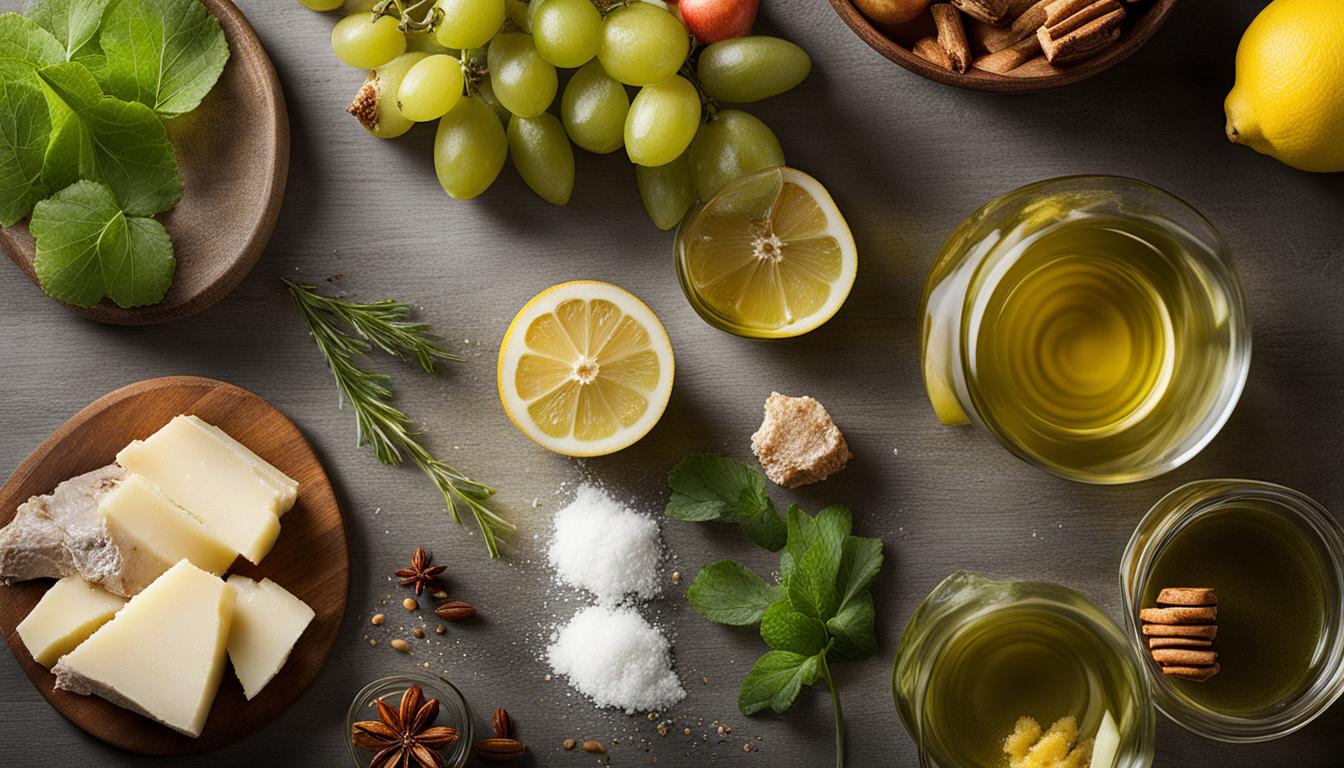Are you looking for alternatives to white wine in your recipes? Whether you’re cooking without white wine or simply prefer non-alcoholic options, there are plenty of substitutes available that can enhance the flavors of your dishes. Let’s explore some of the best white wine substitutes that you can use in your cooking.
Contents
- 1 Why Cook With White Wine at All?
- 2 The Best Substitutes for White Wine
- 3 Vermouth as a Substitute
- 4 White Wine Vinegar as a Substitute
- 5 Chicken Broth as a Substitute
- 6 White Grape Juice as a Substitute
- 7 Apple Cider Vinegar as a Substitute
- 8 Ginger Ale as a Substitute
- 9 Conclusion
- 10 FAQ
- 10.1 What can I substitute for white wine in a recipe?
- 10.2 Are there non-alcoholic white wine substitutes for cooking?
- 10.3 Can I use vinegar instead of white wine in cooking?
- 10.4 What can I use as a replacement for white wine in recipes?
- 10.5 How do I use vermouth as a substitute for white wine?
- 10.6 Can I use white wine vinegar instead of white wine in a recipe?
- 10.7 How can I substitute chicken broth for white wine?
- 10.8 Can I use white grape juice as a substitute for white wine in recipes?
- 10.9 Is apple cider vinegar a suitable substitute for white wine in cooking?
- 10.10 Can I use ginger ale instead of white wine in recipes?
- 11 Source Links
Key Takeaways:
- When cooking without white wine, it’s important to understand the role it plays in adding depth, richness, and acidity to dishes.
- Vermouth, white wine vinegar, chicken broth, white grape juice, apple cider vinegar, ginger ale, and even water can be used as substitutes for white wine.
- Each of these alternatives contributes unique flavors and characteristics to your recipes.
- Experimenting with different substitutes can expand your culinary repertoire and create delicious dishes without compromising on taste.
- Adjust the amounts and flavors of the substitutes based on your personal preference and the requirements of the recipe.
Why Cook With White Wine at All?
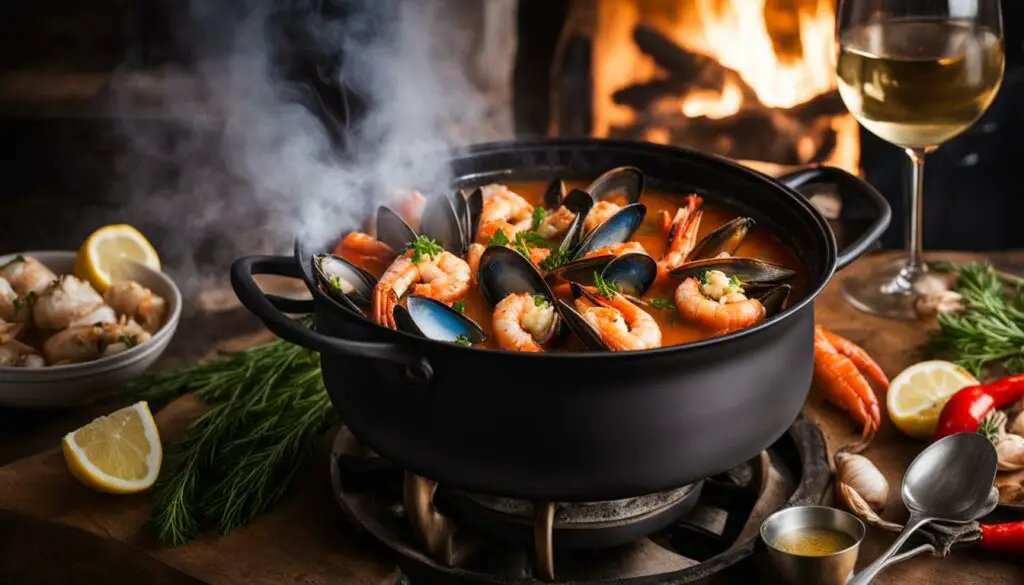
White wine is not just a beverage to be enjoyed on its own; it also plays a crucial role in enhancing the flavors of various dishes when used in cooking. Whether you’re a seasoned chef or a home cook, understanding the benefits of cooking with white wine and its role in culinary creations can elevate your culinary repertoire.
When it comes to cooking with white wine, there are several reasons why it is a popular choice among chefs and home cooks:
- Depth and Richness: White wine adds depth and complexity to dishes, particularly in cream-based sauces where it cuts through the richness and balances the flavors.
- Flavor Enhancement: White wine acts as a flavor enhancer, bringing out the best in various ingredients. It can elevate seafood, poultry, and vegetable dishes, adding a subtle yet distinctive taste.
- Acidity and Deglazing: The acidity in white wine helps balance flavors by providing a bright and refreshing tang. It is often used to deglaze pans, loosening browned bits of food from the bottom and creating flavorful sauces.
By incorporating white wine into your cooking, you can create dishes that are more nuanced, flavorful, and well-balanced. It adds a unique touch that can take your culinary creations to the next level.
“White wine is like a secret ingredient that elevates the flavors of a dish, enhancing its taste and giving it a professional touch.”
Understanding the role of white wine in cooking is essential when considering suitable substitutes. Whether you want to maintain the depth and richness in a sauce or balance the acidity in a dish, finding alternatives that can replicate these characteristics is key.
To further illustrate the benefits of cooking with white wine, here is a visual representation:
| Benefits of Cooking with White Wine | Role of White Wine in Cooking |
|---|---|
| Depth and richness in cream-based sauces | Enhances flavors of dishes |
| Act as a supplement to citrus flavors | Provides acidity and tang |
| Helps deglaze pans | Creates flavorful sauces |
Now that you understand the benefits of cooking with white wine and its prominent role in culinary creations, you can explore suitable substitutes that can provide similar flavors and characteristics. In the next section, we’ll delve into the best alternatives to white wine in cooking.
The Best Substitutes for White Wine

When it comes to substituting white wine in a recipe, there are several options to consider. Whether you’re looking for an alcohol-free alternative or simply don’t have white wine on hand, these substitutes can help you achieve the desired flavors in your cooking.
Vermouth
Vermouth can be used as an excellent substitute for white wine in recipes that call for a small amount. This fortified wine offers a similar flavor profile and can be used in equal measure to white wine. Its versatile nature makes it an ideal choice for various dishes.
White Wine Vinegar
White wine vinegar is a versatile substitute that can be used in various roles played by white wine. It provides the acidity and tanginess that white wine brings to a dish and can be a reliable replacement. To use it as a substitute, dilute it with equal parts broth for recipes that require larger amounts of white wine.
Chicken Broth
If you’re looking for a non-alcoholic substitute, chicken broth can be used as a flavorful alternative to white wine in sauces and other recipes. It adds depth and richness to the dish while providing the necessary liquid volume.
White Grape Juice
White grape juice, when diluted with water, can be used as an alternative to white wine in cooking. Although it is sweeter than white wine, adjusting the sweetness and adding acidity with a dash of vinegar or lemon juice can help achieve a similar flavor profile.
Apple Cider Vinegar
Apple cider vinegar offers acidity and a subtle sweetness similar to white wine, making it a suitable substitute. Adjust the amount according to the recipe requirements and personal taste preference, and consider diluting it with water to balance the flavors.
Ginger Ale
Ginger ale, while unconventional, can bring a unique flavor profile to dishes that call for sweet white wine. Dilute it with water or broth and add a tablespoon of lemon juice or vinegar to balance the sweetness and enhance the flavors in savory recipes.
Water
If none of the above options are available, water can be used as a last resort substitute for white wine in cooking. While it won’t provide the same depth and complexity, it can help maintain the desired liquid volume in the dish.
Vermouth as a Substitute
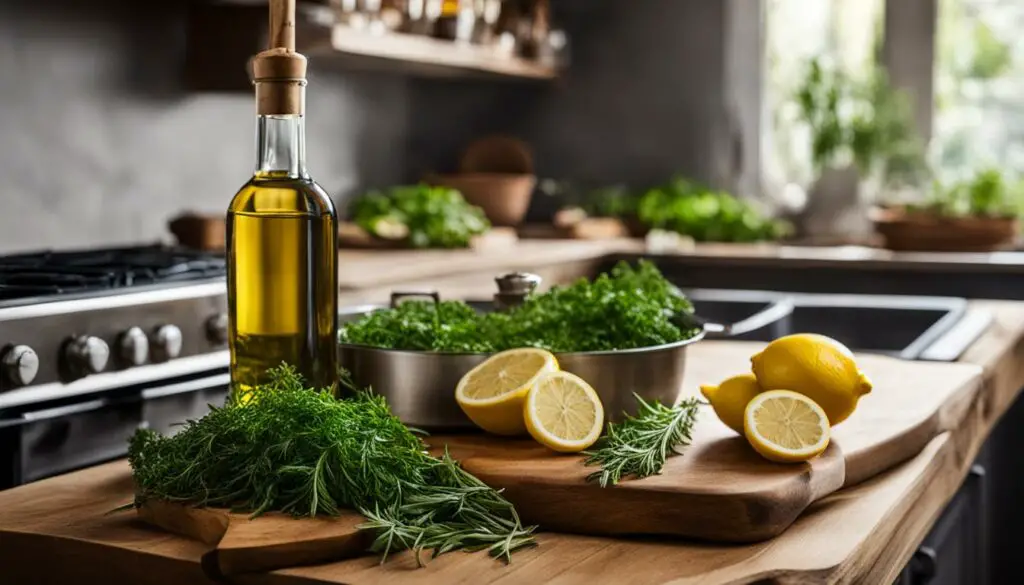
Vermouth, a fortified wine, can be a great substitute for white wine in recipes that call for a small amount. Its complex flavors and acidity make it an excellent alternative to achieve the desired taste in your dishes. When using vermouth as a substitute for white wine, it’s important to choose the dry variety to maintain the flavor profile of the dish.
For recipes that require less than a ¼ cup of white wine, use vermouth in equal measure as a replacement. Its aromatic and herbal notes can enhance the flavors of your dish, creating a delicious and unique culinary experience. Whether you’re cooking pasta sauces, risottos, or even poaching fish, vermouth can elevate your recipes to the next level.
If you’re looking to infuse your dishes with a touch of elegance and sophistication, consider using vermouth instead of white wine. Its distinctive flavor profile can add depth and complexity to your culinary creations.
To showcase the versatility of vermouth as a substitute, here’s a simple recipe that incorporates this ingredient:
| Recipe | Ingredients |
|---|---|
| Chicken Piccata |
|
Instructions:
- Preheat your oven to 200°F (90°C) to keep the cooked chicken warm while preparing the sauce.
- Season the chicken breasts with salt and pepper, then dredge them in flour, shaking off any excess.
- In a large skillet, melt the butter over medium-high heat. Add the chicken breasts and cook until golden brown on both sides, about 4-5 minutes per side. Transfer the cooked chicken to a baking sheet and place it in the preheated oven to keep warm.
- Reduce the heat to medium-low and add the vermouth to the skillet, using a wooden spoon to scrape up any browned bits. Allow the vermouth to simmer for about 1 minute.
- Add the chicken broth, lemon juice, and capers to the skillet. Increase the heat to medium and simmer the sauce until it thickens slightly, about 5 minutes.
- Remove the chicken from the oven and place it back in the skillet, coating it with the sauce. Cook for an additional 2-3 minutes, ensuring the chicken is fully coated and heated through.
- Transfer the chicken to serving plates and spoon the sauce over the top. Garnish with chopped fresh parsley.
- Serve the chicken piccata with your favorite side dishes and enjoy!
With vermouth as a substitute for white wine, you can delight your taste buds with a unique twist on classic recipes. Experiment with different flavor profiles and discover new culinary possibilities by incorporating vermouth into your cooking repertoire.
White Wine Vinegar as a Substitute
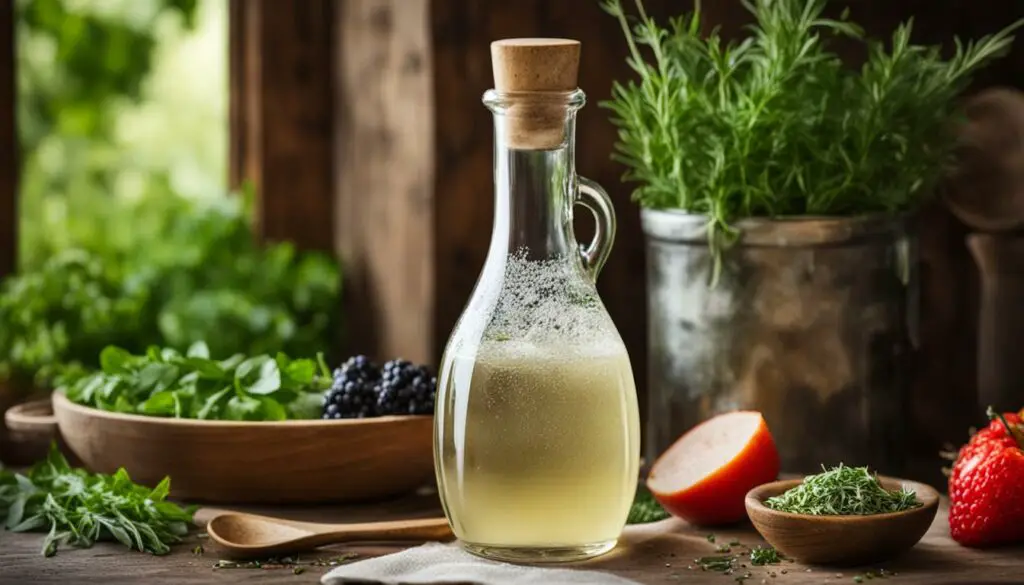
When it comes to substituting white wine in recipes, white wine vinegar is a versatile option that can mimic the qualities of regular white wine. White wine vinegar adds acidity and depth to dishes, making it a suitable alternative in various culinary applications. Whether you’re preparing a savory sauce or deglazing a pan, white wine vinegar can be seamlessly incorporated into your recipes.
When using white wine vinegar as a substitute, it’s important to consider the amount needed for the recipe. For recipes that require a larger quantity of white wine, it’s recommended to dilute the vinegar with broth. This helps to balance the flavors and prevent the vinegar from overpowering the dish. On the other hand, for smaller amounts, such as deglazing a pan, half a tablespoon of white wine vinegar is usually sufficient.
To enhance the acidity of white wine vinegar, you can also add a squeeze of lemon juice. This not only boosts the tartness but also brings a refreshing citrus note to your recipes. With white wine vinegar as a substitute, you can achieve the same tangy, acidic profile that white wine provides.
Whether you’re looking to reduce alcohol content, prefer the taste of vinegar, or simply don’t have white wine on hand, white wine vinegar offers a reliable alternative. Its versatility and ability to replicate the flavor and acidity of white wine make it an excellent choice for cooking. Try incorporating white wine vinegar into your next recipe to create delightful, flavorful dishes without the need for white wine.
Chicken Broth as a Substitute
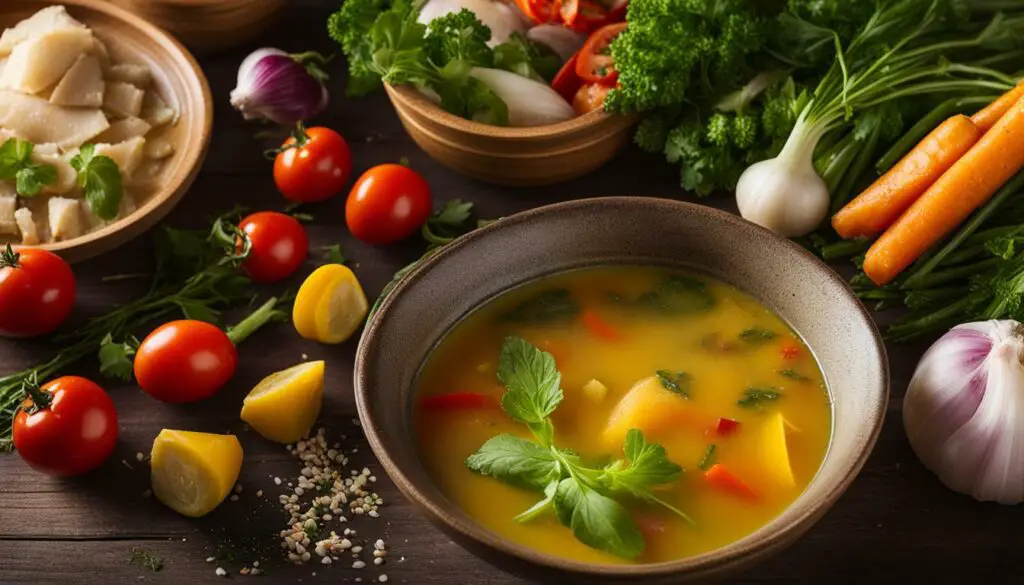
Chicken broth can be a reliable substitute for white wine in sauces, adding flavor and maintaining the proper liquid ratio in dishes. While it may not provide the same complexity and acidity as white wine, chicken broth offers its own savory notes that can enhance the taste of your recipes.
To mimic the acidity typically found in white wine, you can add a tablespoon of lemon juice to half a cup of chicken broth. This additional touch of acidity helps replicate the tanginess that white wine brings to a dish.
Whether you’re looking to make a creamy sauce or add depth to your recipe, using chicken broth as a substitute for white wine can be a practical and flavorful solution.
White Grape Juice as a Substitute

White grape juice, the unfermented form of white wine, can be a suitable substitute for white wine in recipes. It provides a similar fruity flavor and undertones to enhance the taste of your dishes. However, it is important to note that white grape juice is sweeter than dry white wine, so adjustments need to be made to maintain the balance of flavors in your recipe.
When substituting white grape juice for dry white wine, you can follow this simple guideline:
- For a recipe that calls for ½ cup of dry white wine, use ¼ cup of white grape juice.
- Dilute the white grape juice with an equal amount of water to reduce its sweetness.
- Add a teaspoon of vinegar or lemon juice to replicate the acidity that white wine provides.
This combination will help mimic the flavor and characteristics of white wine in your recipe, while ensuring that the sweetness is balanced and the acidity is present.
Using white grape juice as a substitute for white wine opens up new possibilities in your culinary adventures. It works well in recipes such as sauces, marinades, and desserts, where the fruity notes can complement and elevate the flavors.
Apple Cider Vinegar as a Substitute
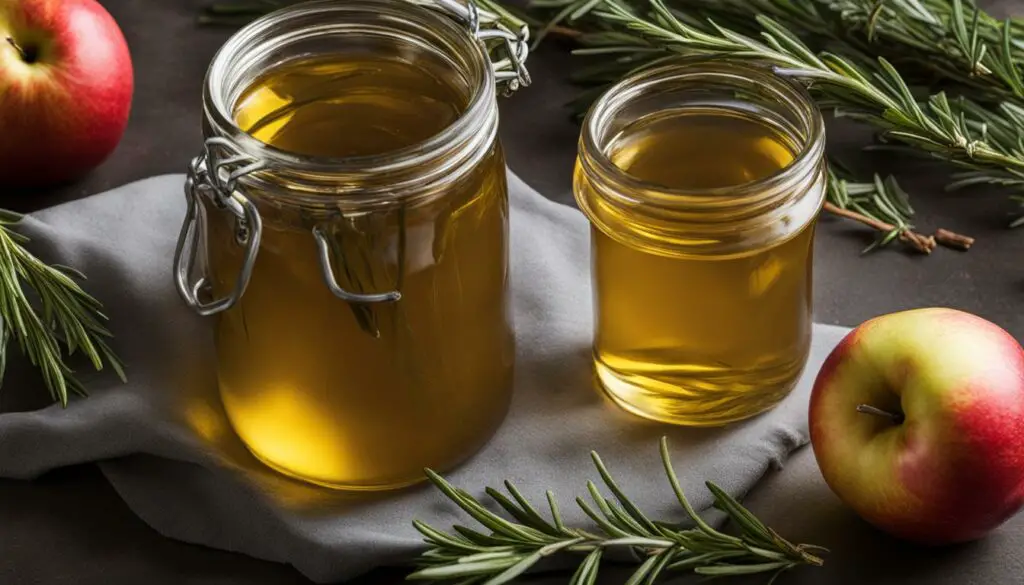
When it comes to finding a suitable substitute for white wine in recipes, apple cider vinegar can be a great alternative. Not only does it provide the necessary acidity, but it also offers subtle sweetness and a complex flavor similar to white wine.
To use apple cider vinegar as a substitute, it is important to adjust the amount based on the recipe requirements and your personal taste preference. Start by adding small increments and tasting as you go to ensure the desired flavor balance.
A good tip is to dilute the apple cider vinegar with water, especially if the recipe calls for a larger quantity of white wine. This helps to balance the flavors and acidity, preventing the vinegar from overpowering the dish.
Whether you’re making a savory sauce or a flavorful marinade, apple cider vinegar can bring a unique twist to your recipes, providing the acidity and complexity you would expect from white wine.
Experiment with apple cider vinegar in your favorite dishes to discover new flavors and enjoy the benefits of this versatile substitute.
Ginger Ale as a Substitute
Ginger ale may seem like an unconventional substitute for white wine, but it can bring a unique flavor profile to dishes. It works well as a substitute for sweet white wine in recipes. However, it may be too sweet for savory dishes, so diluting it with water or broth and adding a tablespoon of lemon or vinegar can help balance the flavors.
Conclusion
When you find yourself without white wine in your pantry, there are plenty of substitutes available. Vermouth, white wine vinegar, chicken broth, white grape juice, apple cider vinegar, ginger ale, and even water can be used as alternatives to white wine in recipes. These substitutes can provide similar flavors and characteristics to enhance the taste of your dishes. Experimenting with these substitutes can open up new possibilities in your cooking adventures without compromising on flavor.
FAQ
What can I substitute for white wine in a recipe?
There are several options you can use as a substitute for white wine, including vermouth, white wine vinegar, chicken broth, white grape juice, apple cider vinegar, ginger ale, and even water.
Are there non-alcoholic white wine substitutes for cooking?
Yes, you can use non-alcoholic alternatives such as vermouth, white grape juice, apple cider vinegar, and ginger ale as substitutes for white wine in cooking.
Can I use vinegar instead of white wine in cooking?
Yes, white wine vinegar can be used as a versatile substitute for white wine in cooking. It adds acidity and flavor to your dishes.
What can I use as a replacement for white wine in recipes?
In place of white wine, you can use vermouth, white wine vinegar, chicken broth, white grape juice, apple cider vinegar, ginger ale, or even water as substitutes in your recipes.
How do I use vermouth as a substitute for white wine?
To use vermouth as a substitute for white wine, use dry vermouth in equal measure to the amount of white wine called for in your recipe. It works well for smaller amounts of white wine in cooking.
Can I use white wine vinegar instead of white wine in a recipe?
Yes, white wine vinegar is a versatile substitute for white wine. You can use it in various roles, such as adding acidity, deglazing pans, or enhancing flavors in your dishes.
How can I substitute chicken broth for white wine?
Chicken broth can be used as a reliable substitute for white wine in sauces. While it may not provide the same complexity and acidity, it adds flavor and maintains the proper liquid ratio in your dishes.
Can I use white grape juice as a substitute for white wine in recipes?
Yes, you can use white grape juice as a substitute for white wine in recipes. However, since white grape juice is sweeter than white wine, you may need to dilute it with water and add vinegar or lemon juice for acidity.
Is apple cider vinegar a suitable substitute for white wine in cooking?
Yes, apple cider vinegar can be used as a substitute for white wine in cooking. It provides acidity, subtle sweetness, and complex flavors similar to white wine.
Can I use ginger ale instead of white wine in recipes?
Ginger ale can be an unconventional substitute for white wine, especially in sweet recipes. However, it may be too sweet for savory dishes. To balance the flavors, you can dilute it with water or broth and add a tablespoon of lemon juice or vinegar.

